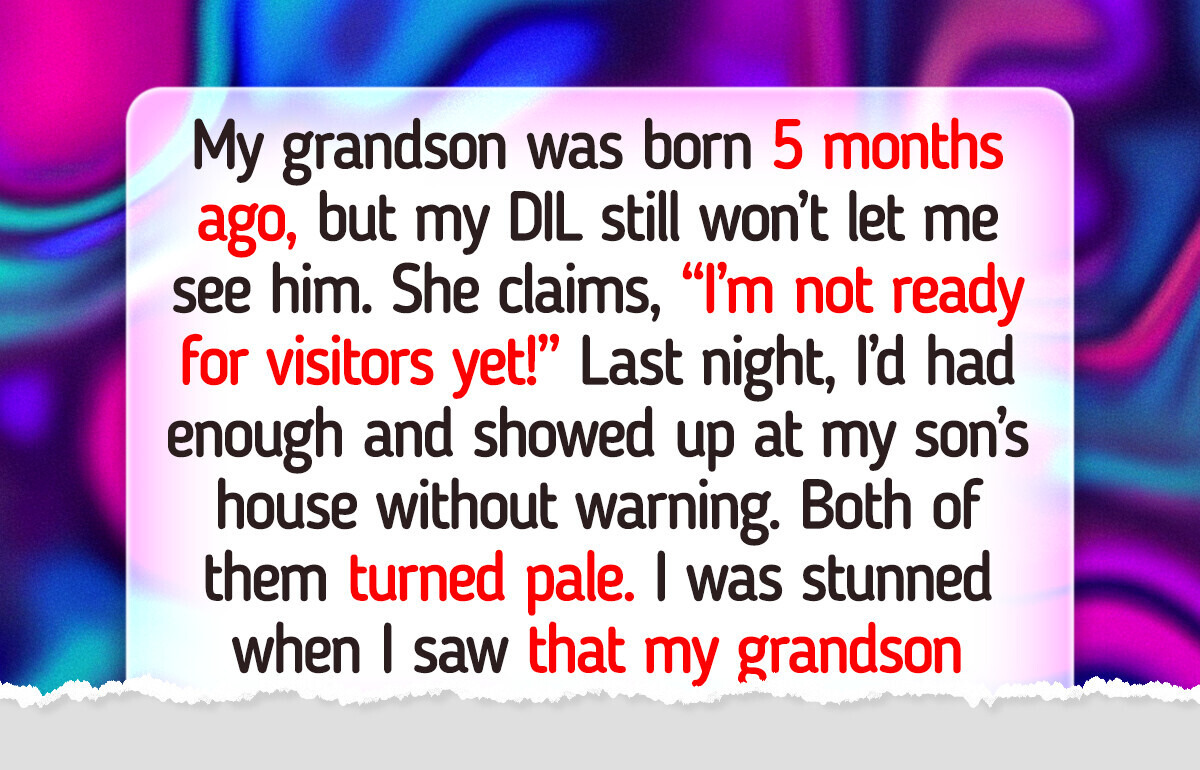What a vile person you are. Racist and judgemental. If your son has chosen to accept this baby then so should you and you should treat it exactly the same as any other grandchildren. His wife made a serious mistake but he has forgiven her. Who are you to judge. I'm sure you have things in your past you regret doing. I'm glad they're dropping you from their family. They deserve better.
I Wasn’t Allowed to See My Grandson for 5 Months — And the Real Reason Left Me Speechless

Family can be a source of incredible happiness, yet it can also bring deep hurt when trust is betrayed or personal boundaries are ignored. Many people find themselves caught in a whirlwind of emotions when facing tough family challenges — especially when children, loyalty, and honesty are at the heart of the matter. Recently, one reader reached out to us with a touching letter about a painful family ordeal that started when she was kept from seeing her grandson for five long months.
Here’s Angela’s letter:

Dear Now I’ve Seen Everything,
My first grandson was born five months ago, but my daughter-in-law still won’t let me see him. She claims, “I’m not ready for visitors yet!” I haven’t even seen a photo — yet her own mother moved in to help.
Last night, I’d had enough and went to my son’s house without warning. Both of them turned pale.
I was stunned when I saw that my grandson was dark-skinned, unlike my very fair-skinned son and daughter-in-law.
My son took my hand and admitted it had been a shock for them too. Early in their marriage, his wife had a brief fling. They never imagined the baby wasn’t his when she became pregnant. But once the baby was born, he chose to raise him as his own.
They kept me away because they were afraid of how I might react. I was overwhelmed — hurt by the betrayal, and devastated that the child I thought was my grandson isn’t biologically related to us.
I told my son he was no longer my son, just as the child was no longer his. I told my daughter-in-law she wasn’t welcome in my home, just as I wasn’t welcome in her child’s life — and that neither this child nor any future ones should expect anything from me. Then I walked away.
Now I’m not sure what to do next.
Angela
Dear Angela, your situation is deeply painful, filled with layers of betrayal, shock, and heartbreak. Here are four practical tips to help you navigate your next steps.
Try to understand your son’s decision, even if you’re not ready to support it just yet.
Your son is still the man you raised — and he made a choice to raise a child who isn’t biologically his. That choice doesn’t erase the betrayal, but it does speak to his values and capacity for love.
If you ever hope to reconnect with him, this may be the door: not pretending the child is yours, but seeing him as the one your son has chosen as his.
Write a letter to process — not to blame or attack.
Set aside some time to write a sincere letter to your son and daughter-in-law — not to place blame, but to work through your own feelings. Let them know how deeply hurt you felt being kept at a distance, how overwhelming the truth was, and why your response was so strong. Even if you choose never to send it, putting your emotions into words can help you release the pain in a healthy way, preventing those feelings from simmering beneath the surface or bursting out later.
Set boundaries without burning bridges.
You don’t have to accept everything or force yourself into a role you’re not ready for. But rather than cutting them off permanently, consider saying something like, “I need space. I’m not ready to be part of this right now, but I’ll let you know when I am.”
This gives you time to grieve and breathe — without closing the door forever.
Speak to someone who’s not emotionally involved.
Whether it’s a therapist or counselor, confiding in someone outside your family can help you untangle emotions like betrayal, confusion, sadness, or shame. Although this situation isn’t your fault, the weight of it falls on you. An impartial person can support you in deciding how to manage or release that burden.
Earlier, a 65-year-old woman reached out to share her story. After the tragic loss of her son and daughter-in-law, she became the guardian of her grandchildren and raised them herself. Recently, however, her granddaughter has acted in an unexpected way.
Comments
Related Reads
My Twin and I Took a DNA Test for Fun, Only to Discover a Shocking Family Secret

10 Fascinating Stories That Seem Like Movie Plots, but Are Actually True

“It’s Intentional Disrespect.” The New Portrait of Kate Middleton Has Sparked a Barrage of Negative Reviews

Meet 20 Most Handsome Men in the World, According to Ordinary People

14 People With Truly Unique Features That Instantly Grab Attention

She Was Called the Most Beautiful Girl in the World — Today Her Look Sparks Heated Controversy

11 Real Stories Where the Last Detail Changed Everything

10+ Ways Your Body Could Alert You to Hidden Health Issues

After Removing 10kg (22lbs), She Finally Feels Like Herself Again

I Refused to Give Up My Dream Cruise for My Stepson’s Funeral — Because I Put Myself First

12 Curious Secrets About Figure Skating That Only a Few People Know

17 People Whose Childhood Photos Are Guaranteed to Make You Laugh





